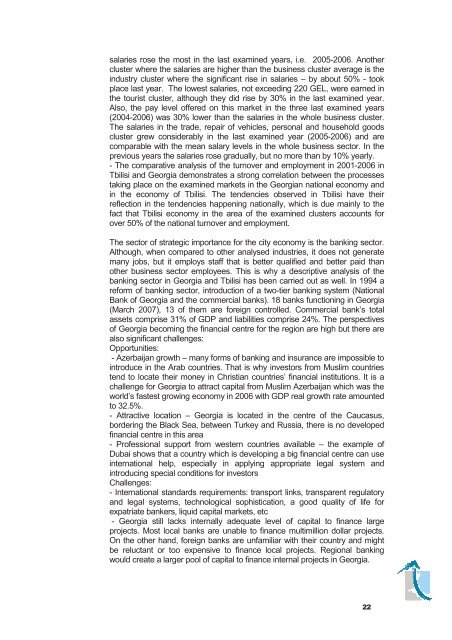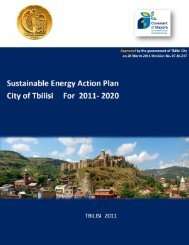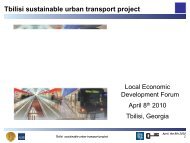LOCAL ECONOMIC DEVELOPMENT PLAN FOR TBILISI ... - LED
LOCAL ECONOMIC DEVELOPMENT PLAN FOR TBILISI ... - LED
LOCAL ECONOMIC DEVELOPMENT PLAN FOR TBILISI ... - LED
Create successful ePaper yourself
Turn your PDF publications into a flip-book with our unique Google optimized e-Paper software.
salaries rose the most in the last examined years, i.e. 2005-2006. Another<br />
cluster where the salaries are higher than the business cluster average is the<br />
industry cluster where the significant rise in salaries – by about 50% - took<br />
place last year. The lowest salaries, not exceeding 220 GEL, were earned in<br />
the tourist cluster, although they did rise by 30% in the last examined year.<br />
Also, the pay level offered on this market in the three last examined years<br />
(2004-2006) was 30% lower than the salaries in the whole business cluster.<br />
The salaries in the trade, repair of vehicles, personal and household goods<br />
cluster grew considerably in the last examined year (2005-2006) and are<br />
comparable with the mean salary levels in the whole business sector. In the<br />
previous years the salaries rose gradually, but no more than by 10% yearly.<br />
- The comparative analysis of the turnover and employment in 2001-2006 in<br />
Tbilisi and Georgia demonstrates a strong correlation between the processes<br />
taking place on the examined markets in the Georgian national economy and<br />
in the economy of Tbilisi. The tendencies observed in Tbilisi have their<br />
reflection in the tendencies happening nationally, which is due mainly to the<br />
fact that Tbilisi economy in the area of the examined clusters accounts for<br />
over 50% of the national turnover and employment.<br />
The sector of strategic importance for the city economy is the banking sector.<br />
Although, when compared to other analysed industries, it does not generate<br />
many jobs, but it employs staff that is better qualified and better paid than<br />
other business sector employees. This is why a descriptive analysis of the<br />
banking sector in Georgia and Tbilisi has been carried out as well. In 1994 a<br />
reform of banking sector, introduction of a two-tier banking system (National<br />
Bank of Georgia and the commercial banks). 18 banks functioning in Georgia<br />
(March 2007), 13 of them are foreign controlled. Commercial bank’s total<br />
assets comprise 31% of GDP and liabilities comprise 24%. The perspectives<br />
of Georgia becoming the financial centre for the region are high but there are<br />
also significant challenges:<br />
Opportunities:<br />
- Azerbaijan growth – many forms of banking and insurance are impossible to<br />
introduce in the Arab countries. That is why investors from Muslim countries<br />
tend to locate their money in Christian countries’ financial institutions. It is a<br />
challenge for Georgia to attract capital from Muslim Azerbaijan which was the<br />
world’s fastest growing economy in 2006 with GDP real growth rate amounted<br />
to 32.5%.<br />
- Attractive location – Georgia is located in the centre of the Caucasus,<br />
bordering the Black Sea, between Turkey and Russia, there is no developed<br />
financial centre in this area<br />
- Professional support from western countries available – the example of<br />
Dubai shows that a country which is developing a big financial centre can use<br />
international help, especially in applying appropriate legal system and<br />
introducing special conditions for investors<br />
Challenges:<br />
- International standards requirements: transport links, transparent regulatory<br />
and legal systems, technological sophistication, a good quality of life for<br />
expatriate bankers, liquid capital markets, etc<br />
- Georgia still lacks internally adequate level of capital to finance large<br />
projects. Most local banks are unable to finance multimillion dollar projects.<br />
On the other hand, foreign banks are unfamiliar with their country and might<br />
be reluctant or too expensive to finance local projects. Regional banking<br />
would create a larger pool of capital to finance internal projects in Georgia.
















